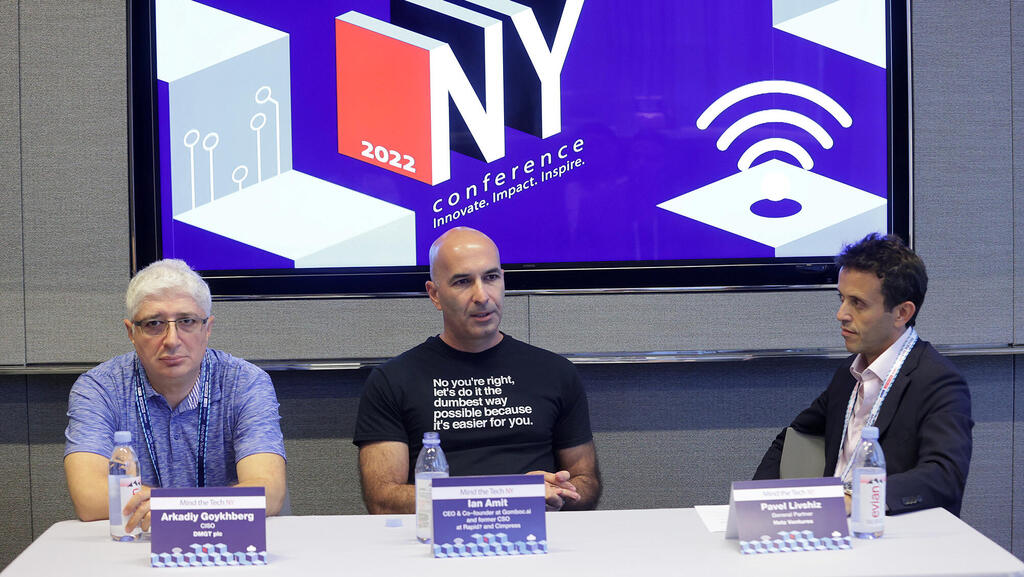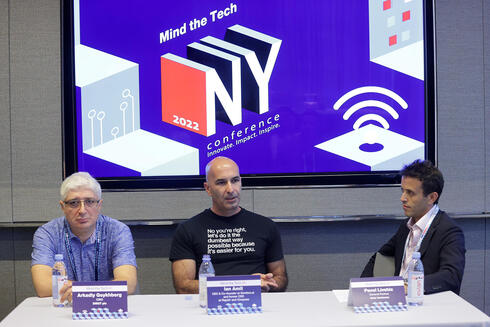
Mind the Tech NY 2022
"If you recruit the wrong person, you end up paying for it twice"
Arkadiy Goykhberg, VP of Information Security at DMGT, was speaking in a panel on the economic crisis and its effects on high-tech, which included Ian Amit, Co-founder & CEO of Gomboc.ai, and was hosted by Pavel Livshiz, Partner at Hetz Ventures
The economic crisis, the possibility of down rounds and budget cuts were at the center of the round table hosted by Hetz Ventures as part of the Mind the Tech conference held last week in New York. Ian Amit, Co-founder and CEO of Gomboc.ai and Arkadiy Goykhberg, VP of Information Security at DMGT, participated in the panel hosted by Pavel Livshiz, Partner at Hetz Ventures.
Goykhberg: "My philosophy depends on the development of the company, what stage of growth it is in. It depends on the size of the team and the structure of the company. You can build or purchase tools. I believe in purchasing tools and also in outsourcing rather than building things within the company. We look at the market in order to find products that suit us."
Amit: "My philosophy is a little different. At Cimpress we managed thousands of employees, and I had a central security team that included about 30 employees with representatives in subsidiaries. I see the workforce as a very important investment. However, you have to make sure that they are versatile and don't know how to do just one thing. I also think it's necessary to purchase services from companies that can save me money and divert my manpower from repetitive tasks. This is how you succeed.”
How will the current situation affect the recruitment of new employees?
Amit: "I think every crisis is an opportunity for optimization. Many companies cannot find room for optimization and may need to make changes in personnel. On the other hand, I think the recruitment of employees is getting better and more focused. I hate opening new positions and relying on the job description of the person who left the company. I think that through change you can bring in better people."
Goykhberg: "The whole process of recruiting employees, their training and their onboarding takes six months. If you recruit the wrong person, you end up paying for it twice. It's a very complicated process and you have to think about what abilities you require from that person. It's not always easy to evaluate people. When you have large teams it's easy to move people around, but when you have a small team you have to choose them more carefully."
A new fiscal year is beginning soon, meaning new budgets. What is driving managers' thoughts looking ahead?
Amit: "Every budget season I look at all the processes I have in the company. We identify where there are problems and then decide if we need to bring in more personnel to solve them or do we need an optimization process to build synergies between departments. I constantly ask for feedback from my team and also others. Together, we check where they see issues."
Has the dialogue between management and boards changed following the crisis?
Amit: "I have not seen boards that talk about immediate profits, unless they are relatives of the entrepreneurs. I found myself sometimes educating the board about cybersecurity and sometimes having to explain the changes happening in the world and their effects. In the end, as CEO, you come to the board to show them that you are on track and that you are ready to take the necessary risks. I don't think that will change. I do think discussions will be more budget sensitive and center around backup plans in case management is required to cut budgets."
Goykhberg: "It depends on the relationship between management and the board of directors. Conversations are usually at the strategic level about how much risk the company is willing to take in order to fulfill plans. You have to look at the risks in all dimensions and it's okay to take them when you understand the meaning of each risk."
Related articles:
What advice would you give someone experiencing this for the first time?
Amit: "First of all, good luck. You have to love it because otherwise it will tear you apart. Yes, there is a downturn, but you have to think five years ahead. The decline may last two years, but then there will be three good years. Think about where you want the company to be in five years. Look beyond the crisis. You probably don't have the budget you expected to have, the question is what are you focusing on now?"
Goykhberg: "Sometimes in situations like these you have to sacrifice something and that’s not necessarily such a terrible thing. You have to have the general direction of what you want to achieve."
